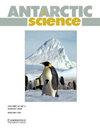The June 2022 extreme warm event in central West Antarctica
IF 2
4区 地球科学
Q3 ENVIRONMENTAL SCIENCES
引用次数: 0
Abstract
Abstract The Antarctic surface mass balance has been shown to be sensitive to the impacts of atmospheric rivers (ARs), which bring anomalous amounts of both moisture and heat from lower latitudes poleward. Therefore, describing the characteristics of ARs and their intensity and frequency in the Antarctic regions by applying detection algorithms became a key method to evaluating their impacts on the surface mass balance and melting events. Several intense AR events have influenced Antarctica during the year 2022, and here we report an event with a peak on 10 June 2022 that was detected at 84°S, having a potential impact on West Antarctica. The extreme warm event originated in the Southern Pacific subtropical region and evolved towards the Southern Ocean, crossing the northern Antarctic Peninsula, before reaching as far as most inland regions in Antarctica, different from other typical ARs that are mostly restricted to the continental coast.2022年6月发生在南极洲中部的极端温暖事件
南极地表物质平衡已被证明对大气河流(ARs)的影响很敏感,大气河流从低纬度向极地带来异常量的水分和热量。因此,应用探测算法描述南极区域ar的特征及其强度和频率成为评估其对地表物质平衡和融化事件影响的关键方法。在2022年期间,几次强烈的AR事件影响了南极洲,在这里,我们报告了2022年6月10日在南纬84度探测到的一次峰值事件,对南极洲西部有潜在影响。这次极端温暖事件起源于南太平洋亚热带地区,向南大洋发展,穿过南极半岛北部,最远到达南极洲大部分内陆地区,这与其他典型的极端温暖事件主要局限于大陆海岸不同。
本文章由计算机程序翻译,如有差异,请以英文原文为准。
求助全文
约1分钟内获得全文
求助全文
来源期刊

Antarctic Science
地学-地球科学综合
CiteScore
3.60
自引率
6.20%
发文量
42
审稿时长
3 months
期刊介绍:
Antarctic Science provides a truly international forum for the broad spread of studies that increasingly characterise scientific research in the Antarctic. Whilst emphasising interdisciplinary work, the journal publishes papers from environmental management to biodiversity, from volcanoes to icebergs, and from oceanography to the upper atmosphere. No other journal covers such a wide range of Antarctic scientific studies. The journal attracts papers from all countries currently undertaking Antarctic research. It publishes both review and data papers with no limits on length, two-page short notes on technical developments and recent discoveries, and book reviews. These, together with an editorial discussing broader aspects of science, provide a rich and varied mixture of items to interest researchers in all areas of science. There are no page charges, or charges for colour, to authors publishing in the Journal. One issue each year is normally devoted to a specific theme or papers from a major meeting.
 求助内容:
求助内容: 应助结果提醒方式:
应助结果提醒方式:


